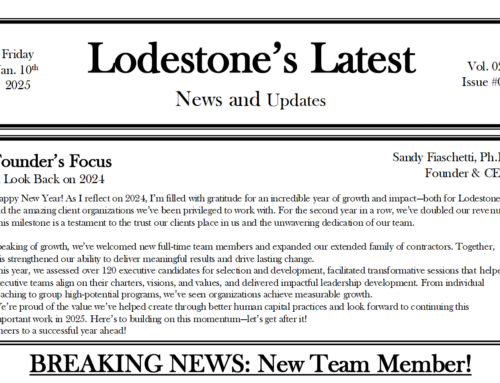
While the iconic ABBA lyric suggests resignation, we believe the opposite is true when it comes to building high performing management teams. At Lodestone we know there is something we can do — and it starts with knowing yourself and your team deeply and intentionally.
In today’s fast-paced, high-stakes business environment, technical competence and strategic vision are no longer enough for senior leaders. The differentiator — and often the deciding factor in team success — is emotional intelligence: the ability to understand yourself, your patterns, your blind spots, and just as critically, to recognize and value the personalities and operating styles of those around you. In our experience we find that leaders are only modestly self-aware, and typically assume and even expect others to be like them, not appreciating the significance and importance of similarities and differences that can be strategically optimized.
The Mosaic of Leadership
Imagine your executive team as a mosaic. Each individual is a distinct, colorful tile — shaped by unique experiences, perspectives, and strengths. No two are alike, and yet when aligned properly, they can form a stunning, coherent image: a high-performing, strategically agile leadership team.
But what happens when the pieces don’t fit?
Often, misalignment isn’t due to a lack of skill or intent — it’s due to a lack of self-awareness and relational understanding. A brilliant strategist may unknowingly steamroll others. A thoughtful listener may struggle to assert their ideas. Without intentional work to understand both self and team, the mosaic remains fragmented — functional, perhaps, but never exceptional.
Why “Knowing Me” Comes First
Our work with senior teams consistently shows that high performance begins with self-awareness. Tools like personality assessments, executive coaching, and 360-degree feedback provide leaders with mirrors — sometimes unflattering — that illuminate how they show up and how they’re perceived.
This is not self-indulgent; it’s strategic. Leaders who understand their values, motivations, and impact are better equipped to:
- Design/build teams
- Delegate based on complementary strengths
- Navigate conflict with empathy and clarity
- Communicate with authenticity and influence
- Make people decisions that unlock real value
“Knowing You” Is the Next Move
Once leaders know themselves, the real leverage comes in understanding each other. This means going beyond surface-level working relationships and developing deep insights into how team members think, decide, and lead.
When done well, this creates trust. And trust, as we all know, is the oxygen of a high-performing team.
At Lodestone we help senior teams go beyond the org chart and PowerPoint decks to truly know one another — to see the full mosaic, not just the piece next to them. Through facilitated experiences, diagnostics, and tailored development journeys, we help executives unlock the full power of collective leadership.
Making It Personal to Make It Powerful
The best teams aren’t built through hierarchy or titles. They’re forged through mutual understanding, psychological safety, and a shared commitment to something greater than the sum of the parts.
So the next time ABBA’s “Knowing Me, Knowing You” plays on the radio, don’t think of it as a breakup ballad. Think of it as a leadership mantra.
Because when leaders truly know themselves and each other, there’s nothing they can’t do.
If you’d like to explore how your senior team can move from good to great by strengthening the self-awareness and relational alignment that drive performance, we’d love to talk.




